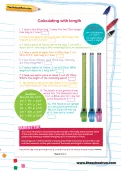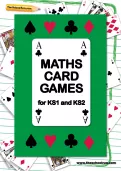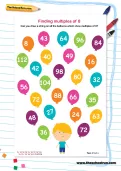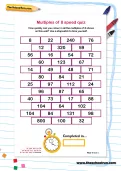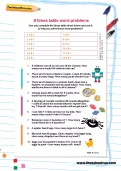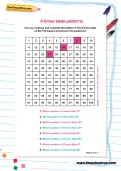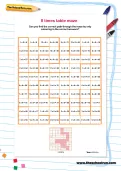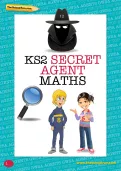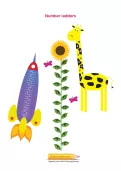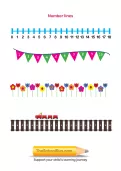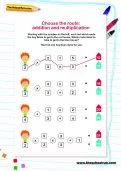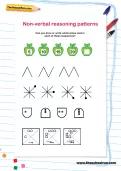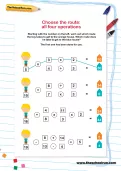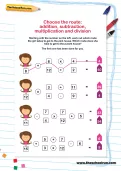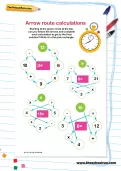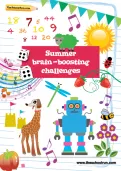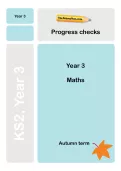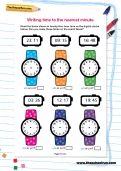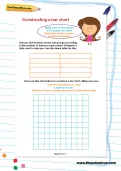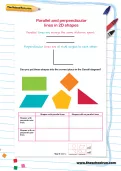Year 3 Maths worksheets
Free worksheets: Weights and measurements, KS2, Y3
You’ll need to login or Register first to access these worksheets for free.
Once you’ve tried out our free worksheets, why not explore all our resources (1000s of worksheets, interactive tutorials, learning packs and more) with a 14-day FREE trial subscription.
Calculating with length
Ready for some calculations with length? Rulers at the ready...
Maths card games for KS1 and KS2
Playing with cards might seem old-fashioned in our screen-loving age, but maths card games will help your child become fluent and confident with numbers – without them even realising they're exercising their maths thinking brain. From number bonds to fractions and probability, try some of our traditional or adapted card games to practise basic maths concepts.
Multiples of 8 speed quiz
An 8 times tables worksheet created by a teacher to help your child find multiples of 8 and to support Year 3 times tables learning.
How quickly can you colour in all the multiples of 8 shown on this wall? Use a stopwatch to time yourself.
How quickly can you colour in all the multiples of 8 shown on this wall? Use a stopwatch to time yourself.
8 times table word problems
Can you complete the times table chart below and use it to help you solve these word problems?
8 times table patterns
Can you continue and complete the pattern of the 8 times table on the 100 square and answer the questions?
8 times table maze
Can you find the correct path through the maze by only colouring in the correct answers?
KS2 maths puzzles: Secret Agent maths
Are you ready to uncover dastardly deeds and confront super-evil villains, armed just with your mathematical skills and lots of courage? Join Oscar Octo and Penelope Penta, agents for the Geometric World Spy Agency, to track down a mysterious nemesis. There'll be a few (ok, a load!) of number puzzles to solve along the way, all designed to challenge KS2 mathematicians to the limit. Will you accept your mission?
Number ladders
Number lines are vertical versions of number lines, used in primary-school maths to help children become familiar with our number system and perform simple calculations like addition and subtraction.
Number lines
Number lines are an essential tool in primary-school maths. Print out our colourful versions for use with your child at home, or use them as inspiration to help your child design (and perhaps decorate) their own number line.
Choose the route: addition and multiplication
Starting with the number on the left, work out which route the boy takes to get to the red house. Which route does he take to get to the blue house?
Non-verbal reasoning patterns
A non-verbal reasoning worksheet created by an educational expert, which provides questions and answers for non-verbal reasoning patterns (or sequences).
Choose the route: all four operations
Starting with the number on the left, work out which route the boy takes to get to the orange house. Which route does he take to get to the blue house?
Choose the route: addition, subtraction, multiplication and division
Starting with the number on the left, work out which route the girl takes to get to the pink house. Which route does she take to get to the purple house?
Arrow route calculations
Starting at the green circle at the top, can you follow the arrows and complete each calculation to get to the final solution? Write it in the pink rectangle.
Summer brain-boosting challenges
Juggle fruit. Work on the technology of the future. Plot and design a lost city, create a zoo of invented animals, learn to talk sdrawkcab and bake a pizza clock and a pastry map. How many of our wonderful brain-boosting challenges can you fit into your summer? All you need are some art materials, imagination and an enquiring mind to have a go at a whole host of practical and reflective activities, suitable for primary-school children (and parents, of course). Have fun!
Year 3 maths Progress checks
Get a sense of your child's progress in maths, and the areas they might need extra practice in, with our Year 3 maths Progress Checks. Three tests, each tailored to one of the school terms, are included, as well as answers to help you mark your child's work and identify any tricky topics.
Writing time to the nearest minute
Read the times shown in twenty-four hour time on the digital clocks. Can you make these times on the watch faces?
Constructing a bar chart
Make a list of first names of 20 people you know. Write their full first names, not their nicknames. Can you divide these names into groups according to the number of letters in each name? Complete a
tally chart to help you. Now use this information to construct a bar chart.
tally chart to help you. Now use this information to construct a bar chart.
Parallel and perpendicular lines in 2D shapes
Parallel lines are always the same distance apart. Perpendicular lines are at right angles to each other. Can you put these shapes into the correct place in the Carroll diagram?
Subtracting three-digit numbers: the number line method
When subtracting three-digit numbers you can use a number line to help you. This method looks like adding, because it starts with the smaller number and then counts on to the bigger number to find the difference between the two numbers. You then add up all the jumps you have made on the top. Use this method to work out these sums.
